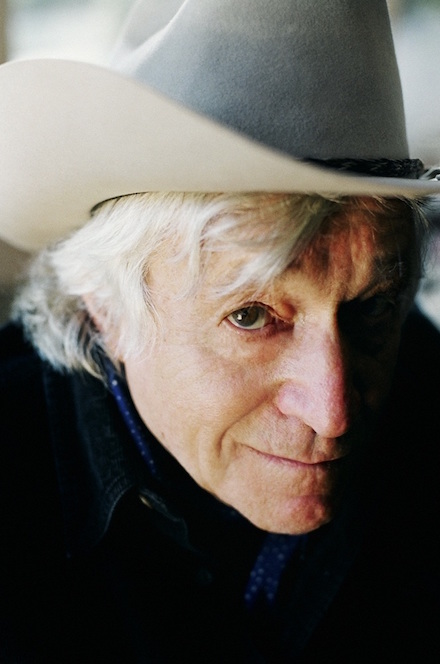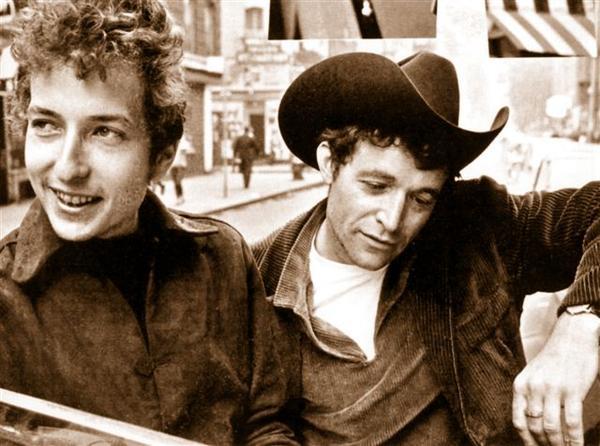(GREAT BARRINGTON, Mass.) – Folk legend and two-time Grammy Award winner Ramblin’ Jack Elliott performs at the Mahaiwe on Friday, October 14 at 8pm.
By now the story of how Elliott Adnopoz — the Brooklyn-raised son of a doctor and schoolteacher — became Ramblin’ Jack Elliott, the heir to Woody Guthrie and singer of cowboy songs extraordinaire, has been often told, but it bears worth repeating, especially when it is told by Elliott himself, who loves nothing more than to a tell a story.
“It wasn’t easy,” Elliott told me, in a 2003 phone interview. “I had to hitchhike out of there,” said Elliott, who was born in 1931 and who has been on the road for over 60 years, some of those as a sailor or truck driver, but most of them as an old-fashioned troubadour.
“I left with two friends, two poets that I knew from school,” said Elliott. “I never saw them again. I hope they’re still alive and they’ve forgiven me for not meeting them at the Greyhound Bus station in Wilmington. I never made it there. I got off in D.C. when I saw the rodeo was in town. They asked me my name and I was embarrassed to pronounce it to them because I knew no rodeo announcer could pronounce Adnopoz. He said that’s OK, we’ll call you Pancho, which was the name of a beloved rodeo clown who was expert in letting bulls throw him into the air and come down uninjured. I think he eventually died from alcohol, not any bull wounds.”
They don’t call him “Ramblin’” Jack for nothing. An answer to any question you ask Elliott gets you more than you bargained for. But Elliott knows this and promises that eventually he gets around to delivering the goods on how a nice Jewish boy whose parents wanted him to be a doctor like his father wound up speaking with a Midwestern drawl and counting horses among his best friends.
“I saw my first rodeo when I was nine years old at Madison Square Garden,” said Elliott. “I’m sure my parents were sorry they ever brought me there. I fell in love with it. Gene Autry played and it was all very romantic to me.
“The city never held any beauty for me, anything nice. I used to ride my bicycle around in search of beautiful scenery. Outside of the ships that were coming and going I didn’t see much beauty there. I used to read National Geographic magazine, and used to dream about being an astronaut and make believe I was in a rocket ship. Of course they didn’t have anything like that in those days. This was long before NASA. I remember thinking I’d like to be an airline pilot. Lindbergh was a big hero, and I’d yell at planes to come land in my back yard.”
The planes never landed, but Elliott took off as soon as he could. When he first ran away from home at age 15, he spent three months with a rodeo, where he was first exposed to cowboy songs and learned to play guitar. Although he returned to Brooklyn and eventually graduated from high school, his path was set, and as soon as he was free he hit the road.
Along the way he met up with Woody Guthrie, becoming a protégé of the legendary folksinger just as Guthrie was beginning to show signs of the debilitating Huntington’s disease that would eventually take his life. But Elliott was with Guthrie long enough to learn almost everything from him – his songs, his style, and his stories – and he became the single most important living transmitter of Guthrie’s work to the next generation of folksingers.
Elliott enjoyed his earliest success in England, where he lived in the late-1950s, when that country’s youth were beginning to turn their ears towards American music. Elliott was something of a sensation there, received as an authentic cowboy singer, and he recorded several albums on his own and with banjoist Derroll Adams.
When Elliott returned to the U.S. in 1961, he met another self-styled Woody Guthrie acolyte with a middle-class Jewish background at Guthrie’s hospital bedside. Bob Dylan and Elliott hit it off immediately, and Elliott became a mentor of sorts to the young Dylan.
“He was kind of an interesting young lad with a very round face and peach fuzz,” said Elliott of his first impressions of Dylan. “He wasn’t growing a beard yet or anything. He was about nineteen, and I was twenty-nine years old. And Woody was exactly twenty years older than me.
“I thought he had great musical talent. He had a very unique way of playing guitar chords. His strumming was a little bit ragged, but deliberately so. I thought it was a little crude, but he had style and personality and I knew he would get better.
“A lot of the folks who listened to him sing didn’t like his singing style or scratchy voice, which was also experimental. And he was sounding a lot like me. I’d seen him do a deliberate imitation of me, something he’d seen me do only a moment before, as if it were a classroom for folksingers, whereas it was a bar where people came to look at musicians. It was a rude and noisy club. Half were neighborhood drunks and the other half were folk fans who had discovered Gerde’s Folk City. It was my first gig in the U.S.”
Although eventually the protégé would far surpass his mentor in fame and fortune, Dylan paid tribute to Elliott’s influence by inviting him to join his traveling roadshow, the Rolling Thunder Revue, which reunited many of the legends of the early Greenwich Village folk scene in 1975.
Around that time, however, Elliott’s own career took a dive. He stopped recording and became erratic and unreliable.
But then in 1995, a quickly recorded album, “South Coast,” released by Red House Records – his first in 20 years – and featuring a greatest-hits-like selection of Guthrie songs and renditions of numbers by Tim Hardin, the Reverend Gary Davis, Derroll Adams and Jesse Fuller, surprised everyone by winning a Grammy Award for best traditional folk album – Elliott’s first mainstream honor.
The floodgates were seemingly opened, and in subsequent years Elliott garnered more Grammy nominations and was even invited to the White House to receive a National Medal of Arts from President Bill Clinton.
Elliott was the subject of a documentary film, “The Ballad of Ramblin’ Jack,” made by his filmmaker daughter, Aiyana Elliott, a touching attempt at an emotional reconciliation between the two that does a terrific job in framing Elliott’s career and influence.
Elliott credits an innate human love for nature for the enduring appeal of his brand of folk music.
“I think a lot of people have a natural craving to be around nature as opposed to machines — although I have a great love for steam engines and diesel engines, and I like the older machinery and early trucks and sailing vessels,” he said. “But there was a lot of humanity attached to those. Half of those machines were the men pulling on ropes or shifting gears.
In February of 2016, Folk Alliance honored Ramblin’ Jack Elliott with a Lifetime Achievement Award. The National Medal of Arts Award winner was also recently honored at the Woody Guthrie Center with an enshrined seat among others who surrounded Woody throughout his life and have kept alive his music, words, and heart.
Tickets are $25 to $50. In addition, a limited number of $15 tickets are available for audience members ages 30 and younger to the regular performances through the Mahaiwe ArtSmart Tix program. The Mahaiwe is located at 14 Castle Street in Great Barrington, Massachusetts. Box office hours are Wednesday through Saturday from noon to 6pm and three hours before show times.


